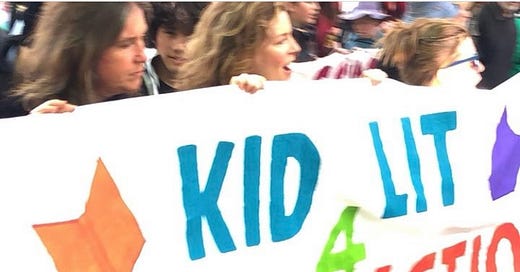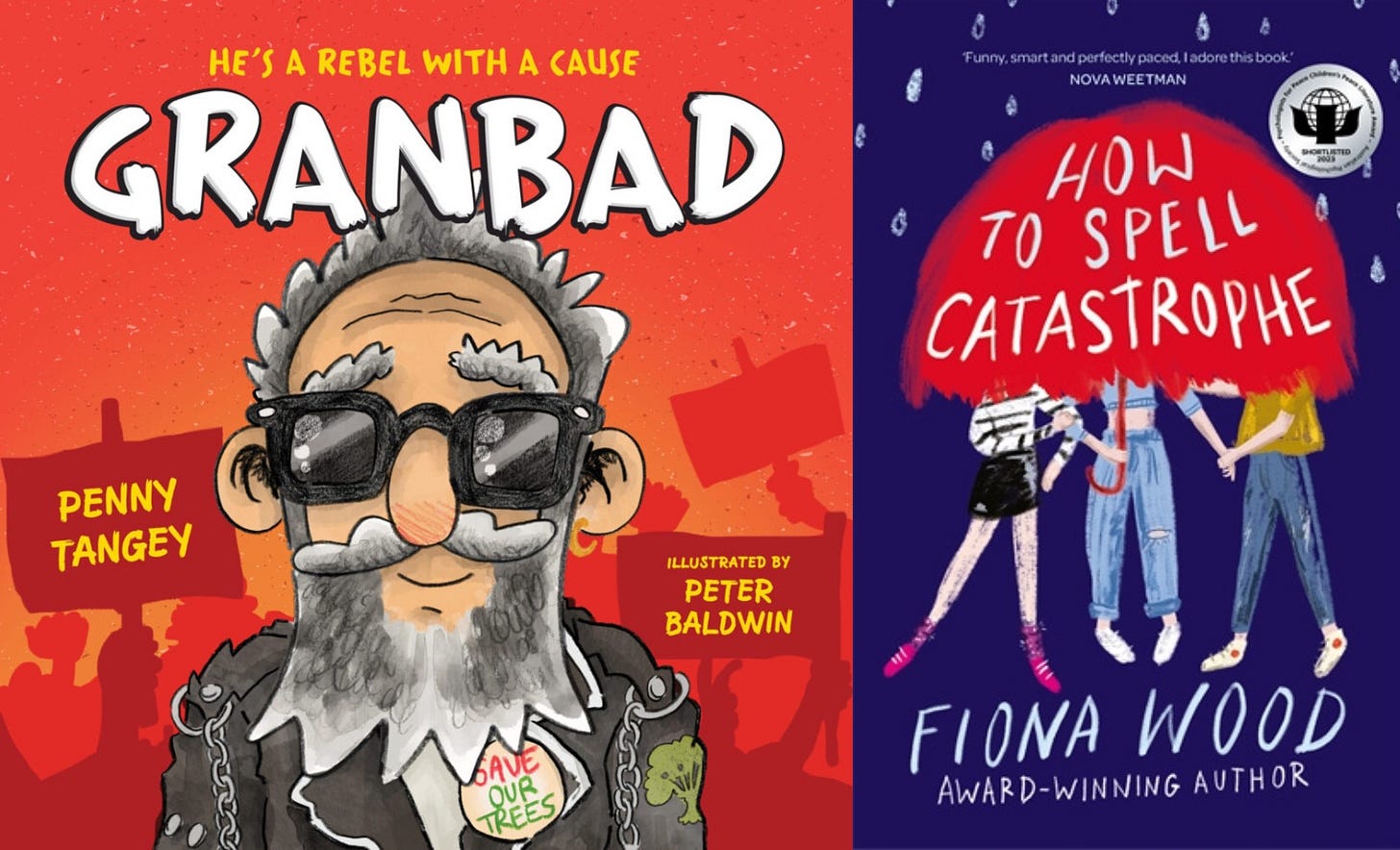Last month I was one of six authors who marched with School Strike 4 Climate through Naarm/Melbourne under a new banner. This keen new group, Kid Lit 4 Climate Action, is the brainchild of author Penny Tangey. I’m delighted to welcome Penny to Voracious. Here she lays out why she set up the group and what action we can take together.
Please subscribe to Penny’s monthly
Why This, Why Now, Why Us?
Children’s publishing aims to educate, entertain and inspire children. People who work in and around the Australian children’s book industry, we can naturally assume, carry a hope that children will have fulfilling lives and be able to put into practice the self-confidence, empathy and creativity they derive from the stories we create or champion. This is only possible if they inherit a reliable future in which to thrive — in other words, a safe climate.
Unfortunately, we know that children around the world are likely to have shorter, harder lives due to climate change. So I am asking: what can those devoted to children’s literature in Australia do about it?
Our industry can be precarious. Simply maintaining a career in children’s publishing can feel difficult enough without wondering: what else can I do? At the same time, publishing children’s books is a privilege and a passion. It provides us with a platform and a degree of authority — both of which some people will try to tell us we shouldn’t use. Given the urgency of the climate crisis, I believe we should ignore them and go with our conscience.
How I Arrived At This Position
In 2022 I became aware that an Australian children’s literature festival is sponsored by a coal export terminal. Until a few years ago, and after considerable negative media exposure, the company’s mascot, Hector the Lump of Coal, would visit the festival to pose with kids and generally be a ‘friendly’ coal face.
I didn’t notice Hector the Lump of Coal when I attended as an author in 2013. I didn’t notice the festival’s sponsors at all. This seems odd in retrospect because I was very aware of climate change. However, at that time I was focused on individual actions, like feeling guilty about my flight to the festival. I spent a lot of time wishing and hoping that our leaders would finally listen to the scientists, but that was all.
Since then I’ve developed a different theory of change and sense of personal responsibility. Individual actions can drive systematic change, but they aren’t enough. Fossil fuel companies will not act until forced to do so by governments. And the Australian government won’t do this unless there is significant, persistent and sometimes disruptive public pressure.
First Steps
Allowing fossil fuel companies to promote themselves delays the energy transition. These companies are at least as dangerous to health as tobacco companies, and they should be just about as welcome at community events, especially those attended by children.
Last year I coordinated a private letter from 50 authors and illustrators asking the festival to seek alternative sponsors. The festival responded politely, although their response didn’t acknowledge the number of signatories, and they seemed open to further discussion. However, since that letter the festival has blocked anyone on social media who criticises their sponsorship arrangements even mildly. (The author Jack Heath has written more about this, see link at the end of this article). Could this be a sign that the pressure is effective?
I found my first attempt at publishing industry-focussed climate action extremely lonely. Although I received many messages of support and help, particularly from Fiona Wood and Julianne Negri, I also felt like I was the one spoiling a good time. My cousin, an extremely dedicated and successful activist, told me what I needed to hear: You can’t do this by yourself.
Kid Lit: Assemble
I looked for a climate action writing group to join in Australia. When I didn’t find one that was working on active campaigns, I decided to start one. I’m very aware that activists have been campaigning for climate action for decades. First Nations people have been caring for country for thousands of years and fighting the destruction of colonialism for hundreds. I’m inspired by this work and hope that anything I do will be inclusive and supportive of it.
A small group of writers had our first online meeting in October. After valiantly trying to fit our name around the acronym KAFCA, we gave up and settled on Kid Lit 4 Climate Action. The group is for anyone involved in the Australian kid lit industry — we want to emphasise that: authors, illustrators, anyone who works in children’s publishing, or adjacent industries like children’s bookselling and libraries. The whole ecosystem.
We’ve jumped straight into doing stuff.
We prepared a submission to the Senate Committee for the Environment on Senator Pocock’s Duty of Care legislation. More than 120 people signed, including high-profile names that we hope will draw attention. The Senate Committee will deliver a report in March 2024.
Fiona Wood and I had a crafternoon and made our first banner. I don’t get to spend much time with other authors, and usually make banners by myself, so it was a treat on many levels.
We took our banner to the November School Strike 4 Climate in Naarm. Everyone remembers the massive strikes just before the pandemic but now they’re starting again with new leadership and it’s inspiring to witness. Even if numbers aren’t as big right now, the school strike organisers are amazing and deserve our support. Holding the Kid Lit 4 Climate banner this time around was Fiona Wood, Juliane Negri, Emily Gale, Ailsa Wild, Nova Weetman, and me. Once again, it was a treat to spend time with kid lit people. We talked about opportunities for climate action, and there was also some pretty useful publishing chat.
What’s Next?
To kick off 2024 we’re inviting an environmental organizer to speak at our virtual meeting about how we can most effectively advocate for climate justice. This will be a chance to bring ideas for actions and to plan our strategy. Would you like to be part of that, either as a listener or a contributor to the discussion?
Finally
It’s instinctive for me to say that I don’t really know what I’m doing, I don’t have all the answers. Don’t we all feel that way about climate change? But the important thing is that I intend to do something — and I know it’s more sustainable and more effective if we do it together, so I’m asking you to join me.
Please subscribe to my monthly newsletter,
to keep in touch, and consider being part of our activities in whatever way you can.Ed notes:
Here’s further information on some of Penny’s talking points:
Watch A 2-minute video about banning fossil fuel ads and sponsorships
Read Hector The Giant Lump Of Coal Is Australia’s Worst Kids’ Mascot by Alex McKinnon (Junkee, 2014)
Read Conservationists draw coal mascot into early grave (ABC Local, 2014)
Read Jack Heath on getting blacklisted from his favourite festival (Jack’s newsletter, July 2023)
See Hector the lump of coal posing with school children at the Whitsunday Voices in 2018 as featured on their Instagram feed
Penny Tangey is the author of several YA and middle-grade novels but most pertinent to this issue is her latest picture book, Granbad. Fellow Kid Lit 4 Climate Action founder Fiona Wood’s latest middle-grade novel, How To Spell Catastrophe, is about a Year 6 student confronting her own climate anxiety and finding empowerment in taking group action.






